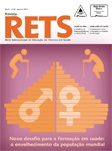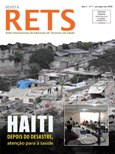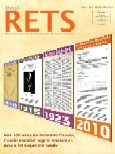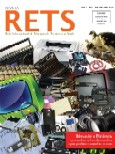RETS Magazine 22

Dear reader,
Yet again, we begin our editorial with apologies for the magazine issue’s disrupted frequency. This time, there were no operational problems, such as unexpected delay in contracting a printing company to print the material or the need to change the translation company. The reason of the delay was a strike that paralyzed much of Fiocruz work for 63 days. Unfortunately, the strike was the means that we Fiocruz professionals and other Brazilian public bodies found to protest against government measures affecting not only workers’ wages, but the very Unified Health System (SUS) and various social programs, bringing even more hindrances to the poorest people of the nation. However, despite all the difficulties, we are back to work to resume with love and dedication a proposal that is relevant to the strengthening of health and the construction of social justice: to contribute, directly or indirectly, to improve the education of health technical workers in many countries.
In this issue of the magazine, you shall read the second and final part of the review of the article “Philanthrocapitalism, past and present: The Rockefeller Foundation, the Gates Foundation, and the setting(s) of the international/global health agenda” in which professor and researcher and Canadian Anne-Emanuelle Birn portrays a very frightening scenario for public health, victim of the increasing influence of international private equity organizations, and shows some forms of struggle for those who still defend health as a fundamental right of the human being and as a duty of the state.
Another highlighted issue is the increasing elderly population in virtually every country and the challenges to national health systems that need to redirect their practices and, therefore, require a suitably skilled workforce.
Furthermore, taking as an example the case of “health assistants” in Portugal, we address the repercussions of the gap between education and health on the professional practice of health workers. We also make an account of experiments developed by SENA (Colombia), in which students of aesthetic courses can understand their role in the health context.
Finally, in the Network News section, it is possible to keep track of what we have done to improve our communication with the public and how the RETS has been working to strengthen research and stir debate on issues relevant to public health and the training of technical workers for the industry.
Enjoy your reading!
RETS Executive Secretariat
Ano:
- 2015



